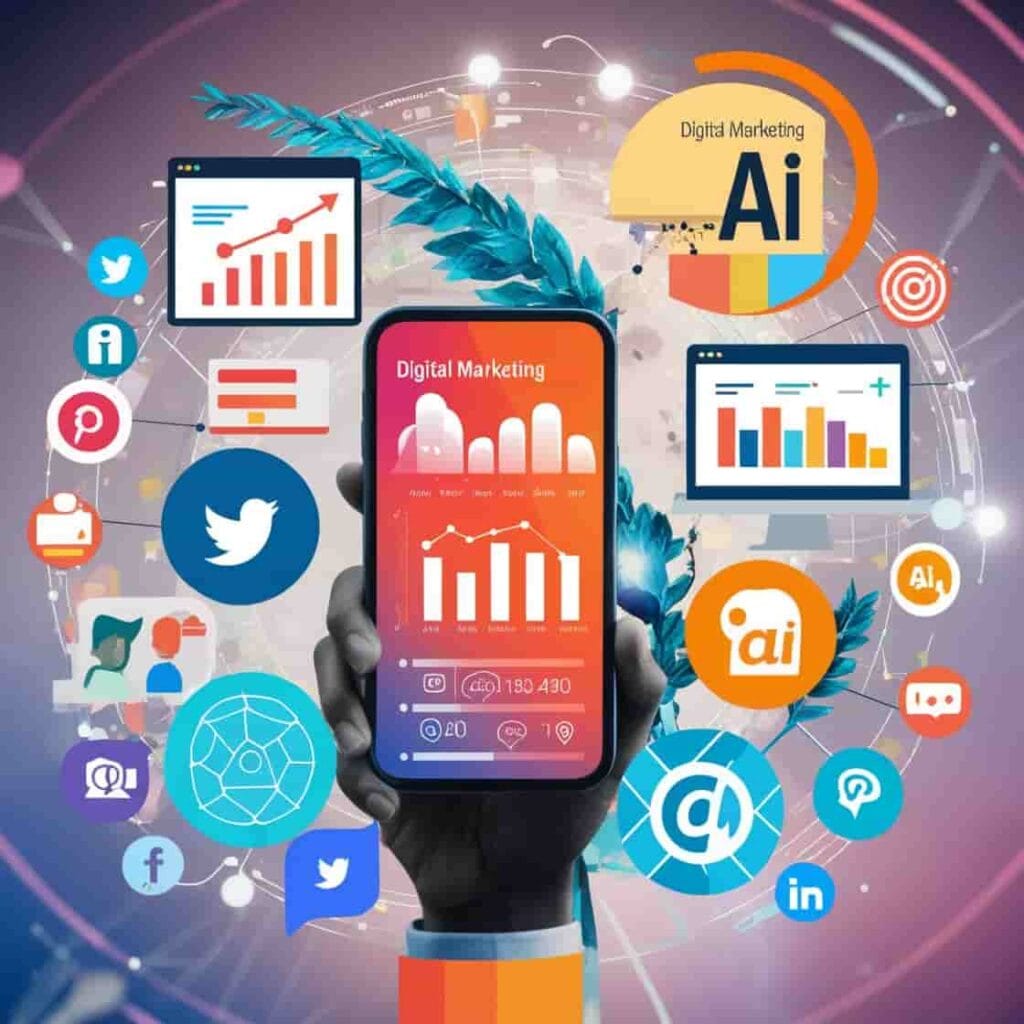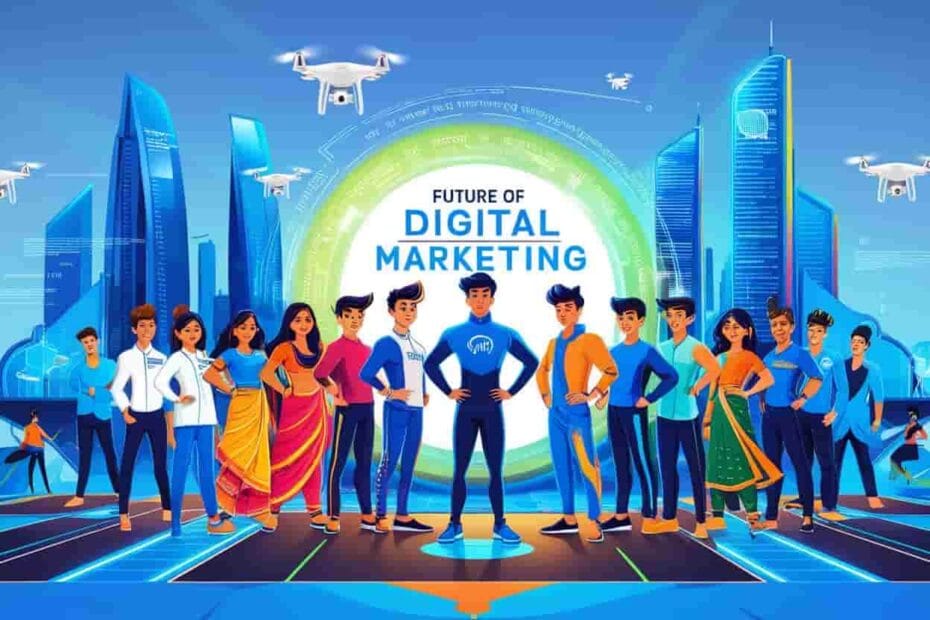Introduction
India stands at the cusp of a digital revolution, driven by rapid internet penetration and an increasingly tech-savvy population. Digital marketing, as a field, has witnessed exponential growth over the past decade and is poised for an even brighter future. With businesses transitioning online, the digital marketing industry in India is becoming a cornerstone of business strategy.
In this blog, we explore the trends, challenges, and opportunities shaping the future of digital marketing in India in detail.

Future of Digital Marketing in India
The Current Landscape
The digital marketing industry in India has been fueled by several factors:

- Increasing Internet Penetration: With over 700 million internet users, India is one of the largest online markets globally. The advent of affordable data plans and improved connectivity has brought millions of new users online each year.
- Smartphone Adoption: Affordable smartphones and cheaper data plans have made it easier for people to access the internet. Today, mobile devices account for over 75% of web traffic in India.
- Growing E-commerce Industry: The rise of e-commerce platforms like Amazon, Flipkart, and Myntra has further boosted digital marketing efforts. These platforms have integrated advanced digital tools, paving the way for innovation in online advertising.
- Social Media Boom: Platforms like Instagram, Facebook, and LinkedIn have become integral to digital marketing strategies, offering unparalleled reach and audience targeting capabilities.
- Government Initiatives: Programs such as Digital India aim to transform India into a digitally empowered society, which indirectly supports the growth of digital marketing.
Key Trends Shaping the Future of Digital Marketing in India
1. Artificial Intelligence and Machine Learning

AI-driven tools are revolutionizing digital marketing by enabling personalization, predictive analysis, and process automation. Here are a few applications:
- Chatbots: AI-powered chatbots provide 24/7 customer support and improve engagement.
- Customer Insights: Machine learning algorithms analyze user behavior to predict trends and preferences, helping businesses create targeted campaigns.
- Content Creation: AI tools can generate customized content at scale, saving time and resources.
2. Voice Search Optimization
With the increasing adoption of voice assistants like Alexa, Siri, and Google Assistant, voice search is becoming a dominant trend. By 2025, it is estimated that nearly 50% of searches will be voice-based. Optimizing content for voice queries and conversational search is essential for staying relevant.

3. Video Marketing
Video content is emerging as the most engaging format for digital audiences. Statistics show that users spend more time on websites with video content. Popular trends include:

- Live Streaming: Platforms like YouTube Live, Facebook Live, and Instagram Live offer real-time engagement opportunities.
- Short Videos: Apps like Instagram Reels and TikTok have popularized short, engaging video content.
- Interactive Videos: Interactive videos enhance user engagement by incorporating clickable elements and personalized narratives.
4. Regional and Vernacular Content
India’s linguistic diversity makes regional content a vital part of digital marketing strategies. Brands are increasingly creating campaigns in languages like Hindi, Tamil, Bengali, and Telugu to connect with local audiences.
5. Influencer Marketing
The influencer economy is growing rapidly, with influencers acting as trusted brand ambassadors. Micro and nano influencers, with their niche audiences, are becoming key players in building brand trust and authenticity.
6. Augmented Reality (AR) and Virtual Reality (VR)
Immersive technologies like AR and VR are redefining user experiences. Applications include:
- Virtual Product Trials: Consumers can virtually try products such as clothes, makeup, or furniture before purchasing.
- Immersive Ads: AR-based advertisements create a deeper connection between brands and users.
7. Programmatic Advertising
Automation in advertising is making ad buying more efficient. Programmatic advertising uses AI to automate the ad-buying process, ensuring precision targeting and better ROI.
8. Social Commerce
Platforms like Instagram and Facebook are integrating e-commerce functionalities, enabling users to shop directly from posts and stories. This trend is transforming social media into a powerful sales channel.
9. Blockchain in Digital Marketing
Blockchain technology is enhancing transparency in digital advertising. It can:
- Prevent ad fraud by verifying ad impressions.
- Ensure secure transactions and data sharing.
- Build trust by providing transparent records of marketing campaigns.
Opportunities in Digital Marketing
Expanding into Rural Markets
As internet penetration extends into rural areas, businesses have a unique opportunity to tap into an underserved audience. Tailoring campaigns for rural demographics and leveraging vernacular content can yield significant results.
Rise of Startups and SMEs
India’s startup ecosystem is flourishing, with many small and medium enterprises leveraging digital marketing to level the playing field. Affordable and targeted digital campaigns can help these businesses grow.
Growth of EdTech and FinTech
The surge in sectors like EdTech and FinTech creates niche opportunities for marketers. Personalized campaigns, mobile apps, and interactive content are becoming essential tools in these industries.
Emphasis on Sustainable and Purpose-Driven Marketing
Modern consumers are increasingly valuing sustainability and social responsibility. Digital marketing campaigns that emphasize a brand’s commitment to environmental and societal causes can foster customer loyalty.
Challenges in Digital Marketing
Keeping Pace with Technology
The rapid evolution of technology requires marketers to continuously learn and adapt. Staying updated on tools, platforms, and algorithms is critical to maintaining a competitive edge.
High Competition
With more brands entering the digital space, capturing audience attention is becoming increasingly challenging. Creative and innovative campaigns are needed to stand out.
Data Privacy and Security Concerns
As data protection regulations become stricter, businesses must prioritize ethical marketing practices and secure user data. Non-compliance can lead to significant penalties and reputational damage.
Ad Fatigue
Overexposure to digital ads can lead to audience disengagement. Marketers must find a balance between reaching out and overwhelming their target audience.
Measuring ROI
Despite the availability of advanced analytics tools, accurately measuring the ROI of digital marketing campaigns remains a challenge for many businesses.
Strategies for Thriving in the Future
Invest in Advanced Analytics
Utilize data analytics tools to gain insights into customer behavior, optimize campaigns, and measure performance.
Focus on Personalization
Personalized marketing campaigns create a deeper connection with customers. Use AI and CRM tools to deliver tailored experiences.
Leverage Omnichannel Marketing
Integrate multiple channels—email, social media, websites, and offline touchpoints—to provide a seamless customer experience.
Upskill Regularly
Continuous learning is crucial in the dynamic world of digital marketing. Attend workshops, take online courses, and participate in industry events to stay ahead.
The future of digital marketing in India is bright, driven by innovation, technological advancements, and an expanding digital audience. While challenges exist, the opportunities far outweigh them. By adopting emerging technologies, embracing creativity, and maintaining ethical practices, businesses can achieve sustainable growth.
As India continues its journey toward a digitally empowered economy, digital marketing will remain at the forefront of this transformation. Brands that adapt to changing trends and prioritize customer-centric strategies will emerge as leaders in this vibrant landscape.

